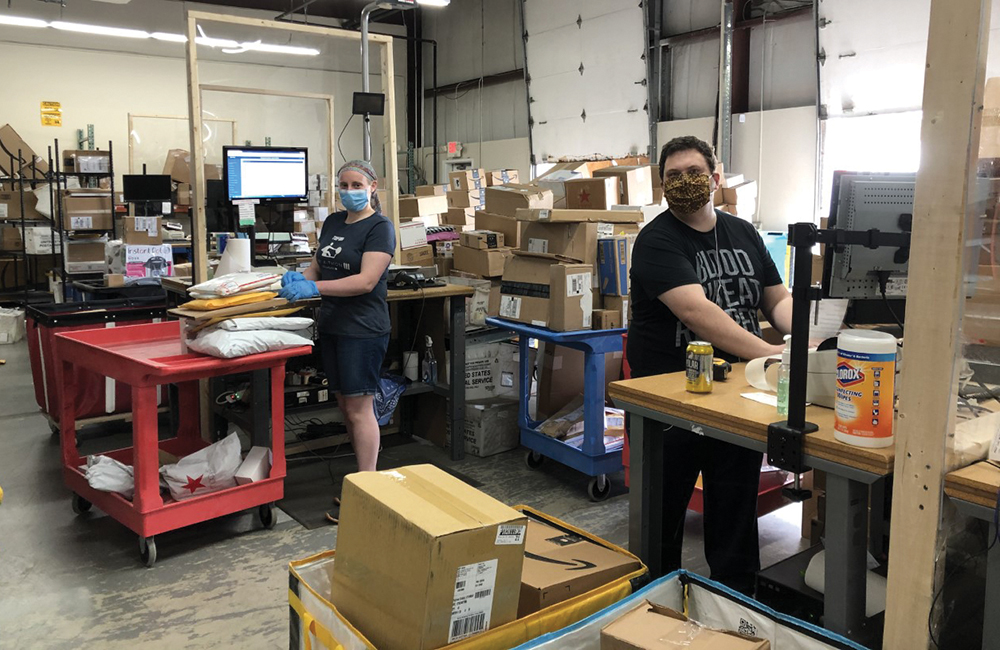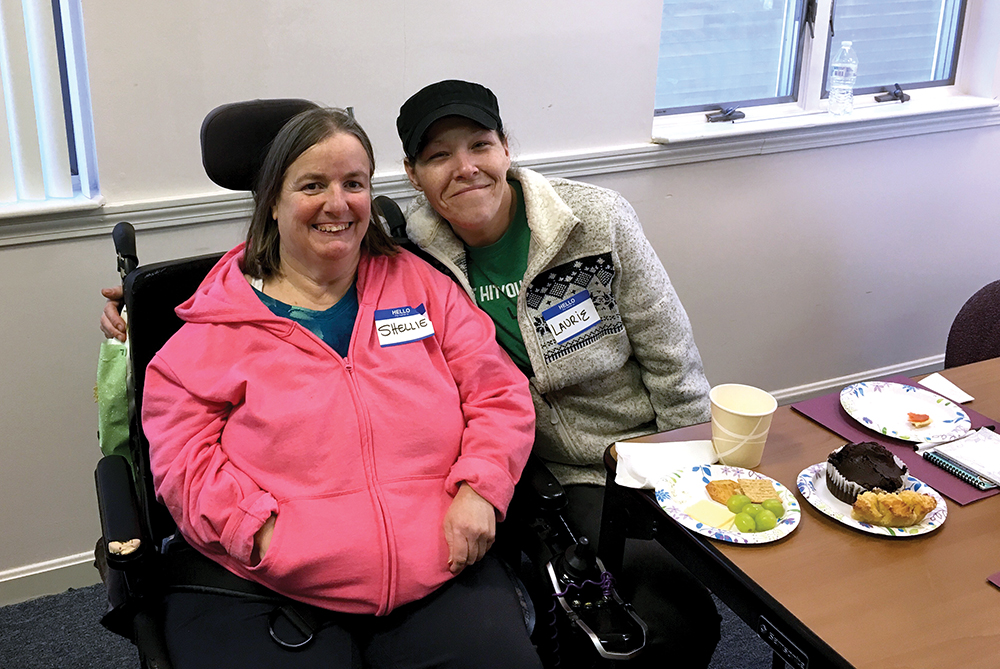
PLUS Company clients Samantha Pohland, left, and Casey Cotreau, working at Stackry, LLC. Courtesy photo.
The pandemic continues to eat away at the workforce, with unemployment reaching 4% in December—up from 2.6% the previous year. But a segment of the workforce—those with disabilities—is being hit even harder. Workers with disabilities experienced an unemployment rate of 11% during the fourth quarter of 2020.
The pandemic has disproportionately hurt disabled workers, with unemployment rising by 37% in the first few months of the pandemic and a loss of 10,000 jobs, according to the University of NH’s Institute on Disability. This is in stark contrast to the 13% reduction experienced among workers without disabilities.
Data from the NH Bureau of Developmental Services shows the top industries employing people with disabilities are retail and customer service (26%), food service (19%) and building, grounds and maintenance (14%), also the top industries affected by COVID-related layoffs.
Maggie Hinkle, director of career and business services for the Nashua-based PLUS Company Inc., says her agency had 130 clients in jobs prior to the COVID outbreak and now has about 50. The agency provides career and business services to individuals with developmental disabilities and acquired brain injuries.
Many of those who continue to work are unable to work from home, Hinkle adds. “Very often, they’re front-line workers who are proud of the fact that they’re still working and keeping the economy going with things like sanitizing and bagging,” she says.
Workers with disabilities have been returning to work at a much slower rate than those without. While the unemployment rate for those with disabilities compared to the general population has always been higher (7.3% vs. 3.5% nationally in 2019, according to the U.S. Department of Labor), the pandemic has exacerbated the gap, says Deborah Ritcey, CEO of Granite State Independent Living, a statewide nonprofit working to promote independence for people with disabilities and seniors.

Granite State Independent Living consumer, Shelly, left, and her personal care attendant, Laurie. Courtesy photo.
Among the reasons are: business closures or reduced revenue, positions that do not lend themselves to remote work, fear of catching COVID, and lack of employer understanding about what is meant by “reasonable accommodation” for workers with disabilities.
In some cases, employees are removing themselves from the available labor pool, at least temporarily, because of fear of catching COVID. “Concern number one is extreme fear of getting the virus, and the reason is that a lot of our customers have compromised immune systems and multiple disabilities, which makes them more susceptible to getting the virus,” says Lisa Hinson-Hatz, state director of the NH Department of Education Bureau of Vocational Rehabilitation, which assists individuals with disabilities in obtaining and maintaining employment.
The agency works with both individuals with disabilities and business partners in need of workers. Tracey Frye, program specialist for the bureau, says many clients have returned to the workforce or expect to return to work soon.
Still, compared to 2019, the number of individuals with disabilities seeking services from the agency was down 31% between March and June, according to Hinson-Hatz.
Jonathan Routhier, executive director of Community Support Network Inc., the trade association for the 10 area agencies serving individuals with developmental disabilities and acquired brain disorders, confirms workers in some of those customer-facing jobs initially removed themselves from the workforce out of fear of catching COVID, but many returned once safety precautions such as masks and sanitizer became required. “The vast majority work outside the home,” he says of his clients. “The whole notion is to be involved in the community.”
At a January meeting of the employment leadership committee of the NH Bureau of Developmental Services, which provides support and services to individuals with developmental disabilities and acquired brain disorders, attendees noted that in addition to a lack of remote work options, some clients lack computers and cannot go to public places to access technology.
Making Accommodations
Disability advocates say they know of no cases where people with disabilities have been dismissed because they wanted to work from home. “I would be hard pressed to think that’s happening and it didn’t make the front page of the newspaper,” says Ritcey.
Such an action would also be illegal. Under the Americans with Disabilities Act, “the employer’s legal obligation to accommodate an employee with a disability remains the same,” says Courtney Lockwood, senior intake attorney for the Disability Rights Center-NH.
Instead, advocates report that employers are doing their best to accommodate workers with disabilities. “I’ve heard great things about employers making accommodations for our individuals,” says Frye. “They could be working at home, having flexible schedules, or they’re holding that job for them.”
However, accommodations are not one-size-fits-all. A person with trauma-related PTSD might feel unable to wear a mask, someone with autism might require more in-person direction, and a worker with intellectual disabilities might need hourly check-ins with a supervisor.
“The law requires an individualized determination based on that person,” says Lockwood, who estimates her office has received dozens of calls from people seeking advice about how their disabilities can be accommodated.
The ADA also stipulates that accommodation should not cause “undue burden” for the employer. “The ADA requires an interactive process,” says Lockwood. “Employers don’t seem to understand that. It’s really important for both sides. It’s not supposed to be adversarial,” she says.
Will Jobs Return?
A big question is whether employment opportunities for people with disabilities will return to pre-COVID levels.
Ritcey fears the pandemic “has set us back years” because, with many small businesses closing due to COVID, the number of available workers has increased and people with disabilities may end up toward the back of the hiring line.
“The unemployment pool is so much larger because of COVID,” she says. “Before, when the unemployment rate was 3%, they had a better chance of getting a job because there weren’t as many people looking for the same job.”
Lockwood, shares that concern, saying, “We’ve got a lot of people out of work right now, and at some point there’s going to be a flood in the market. People with disabilities are a great resource for employers. They just don’t seem to recognize that.”
But not all agree the pandemic has put people with disabilities at further job disadvantage. “I don’t think it’s going to categorically push people [with disabilities] out of the workforce disproportionately,” says Routhier. “I think we’ve learned a lot about the value of having a diverse workforce. All the private providers are committed to keeping people working and
providing new opportunities.”
Hinkle too is optimistic about job prospects for those with disabilities. “Ultimately, once this pandemic gets in check, the economy will rebound, and we’ll have people in jobs again. Businesses are going to have to rebuild. It could be that, initially, employers are going to have to bring back the most skilled people but ultimately, there will be a need for the people we work with.”
Supporting Workers
While they’re waiting for that post-pandemic recovery, agencies are supporting individuals who are employed and preparing others for the jobs to come through remote trainings.
Frye says the Bureau of Vocational Rehabilitation “got creative quickly with what services we could provide,” authorizing them to assist clients filing for unemployment, keeping cases open longer than usual, and in finding temporary employment, “which usually isn’t our goal.”
Training programs for those with disabilities “are still going strong,” she adds. “You can still figure out what you want to do when you grow up, even though it seems like the world is on pause. You can still really make a difference in your life with our program.”
The PLUS Company is focusing on programs “to keep individuals job-ready,” says Hinkle. “Like everyone else, the individuals we work with lost social contact, social interaction. So the PLUS Company has about 40 Zoom classes on a variety of topics from music therapy to coping skills, some gaming, employment skills to keep people fresh for when the pandemic eases.”
David Morgan, president and CEO of Concord-based Future in Sight, which serves children and adults with blindness or visual impairment, says his agency has continued services almost uninterrupted by being innovative. “In this environment, it’s adapt or die,” he adds.

Chef Michael Weinberger leads Future in Sight participants in an adult activities cooking event via Zoom. Courtesy photo.
Employees who are blind or visually impaired have been able to work remotely or in the office, sometimes using special phone systems. The 150 or so children who receive agency services that a regular classroom teacher could not provide continue to receive assistance from Future in Sight teachers and specialists. Occupational therapists, low vision specialists and social workers are providing services to adults either remotely or in-person with safety protocols in place.
“The demand is as great as ever. We’re not shrinking. We’re growing our services,” Morgan says. “As challenging as
COVID is in many ways, it’s created opportunities for folks to participate that may not have been in Concord. Now we can reach out to thousands of clients to join us on a Zoom call.”
Remote work and virtual gatherings are likely to become permanent approaches to how work is conducted.
“I do think this is going to change how and where people work,” says Hinson-Hatz. “I think businesses are really going to look at their positions and say, ‘Suzie is so much more productive at home, why didn’t we think of this before?’ There’s no distractions, or they’re distractions that can be easily managed.”
Ritcey says businesses should “take the time to tap into a grossly underutilized population that can bring great value to their organization. If you set expectations correctly at the start of the gate, your expectations are going to be met so easily.”
Adds Hinkle, “Everyone deserves a chance. Most of the individuals we work with are proud to have jobs and be in the community making money.
“Employers aren’t hiring these individuals out of charity,” she adds. “They’re fulfilling a need.”

 Current Issue - April 2024
Current Issue - April 2024